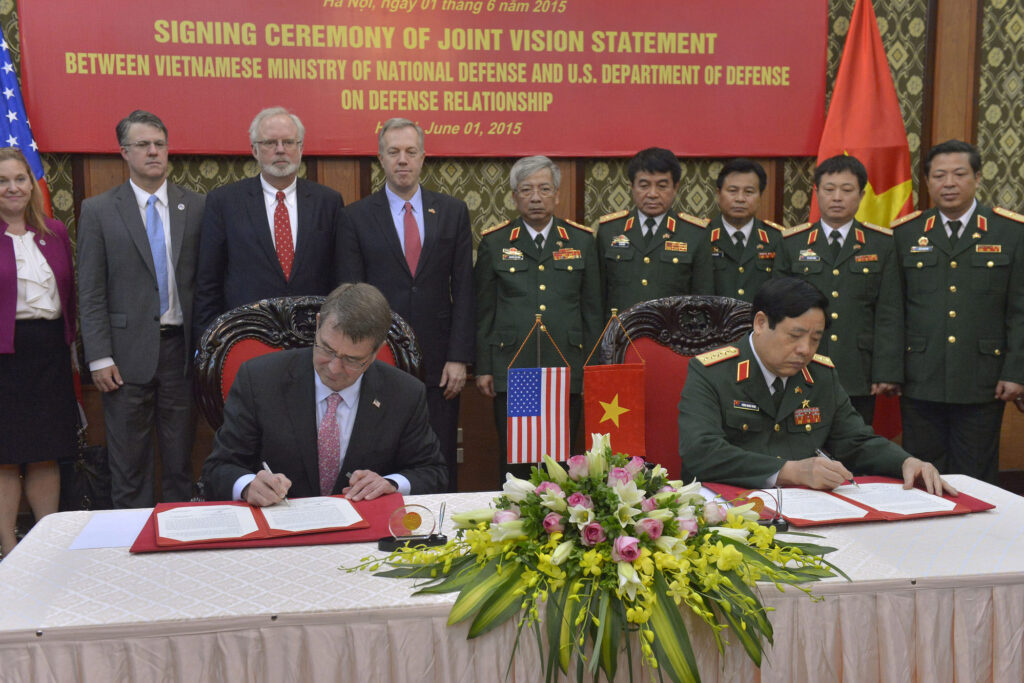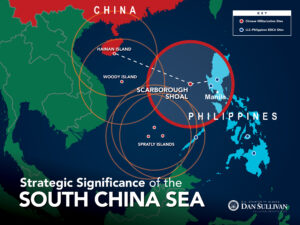Carter: ‘Yes’ To Arms Sales To Vietnam; DoD Won’t Elaborate
Posted on

Defense Secretary Ash Carter with his Vietnamese counterpart in 2015
WASHINGTON: One word from Defense Secretary Ash Carter yesterday opened the door to US arms sales to Vietnam, a former enemy turned potential ally against a rising China. The administration has tiptoed towards easing the ban on lethal weapons sales ever since Vietnamese president Truong Tan Sang met with Obama in 2013, but Carter’s statement goes farther at a critical time, on the eve of Obama’s first visit to Vietnam.
It was an exchange so brief and muted I had to listen to the audio half-a-dozen times and check with sources before I could believe Carter had really said something so momentous, yet apparently so casually. At yesterday’s Senate Armed Services Committee hearing, Sen. Dan Sullivan showed a map revealing how Chinese fighters could potentially strike throughout the South China Sea, the northern Philippines, and Vietnam. SASC chairman John McCain — a former prisoner of war in Hanoi turned advocate of reconciliation — followed up with this question to Carter: “You would support lifting restrictions on provision of weapons to the Vietnamese?”

Graphic courtesy Sen. Dan Sullivan
Carter’s response? “We’ve discussed this in the past, and I appreciate your leadership in that regard, Chairman, and yes.”
That final “yes” is the figurative bombshell that might let the US sell literal bombshells to Vietnam, which has fought multiple wars and skirmishes with its ancient enemy, China, since the US withdrawal in 1973.
“Assuming he [Carter] has a green light from the White House, this is a genuine shift,” said Patrick Cronin, director of the Asia-Pacific Security Program at the Center for a New American Security. “The Obama administration went halfway in this direction when it announced a partial lifting of the ban; this would go all the way if Congress lets it happen.”
“An unfettered arms sales policy toward Vietnam would give strategic weight to America’s rebalance to Asia,” continued Cronin, a longtime advocate of such sales. “The timing is crucial, given that China is stretching its influence over the South China Sea in advance of the international tribunal ruling (on China’s territorial dispute with the Philippines) and President Obama is preparing for his first visit to Hanoi.”
Besides the strategic symbolism of the US standing with Vietnam — which has already agreed to US Army stockpiles of humanitarian supplies on its soil — arms exports could assist Vietnamese operations to secure their airspace and waters against Chinese intrusion.
“Drones are an interesting possibility,” said Dean Cheng of the Heritage Foundation. So are long-range radars and other intelligence-gathering tools, and perhaps helicopters for maritime patrol and resupply of island outposts.
“What they don’t need, for example, is M-16 rifles,” Cheng said. Vietnam’s military is mainly equipped with robust Russian-made or similar equipment, he noted, and bringing in large quantities of maintenance-hungry American-made gear would require “opening up a new supply system in Vietnam, training an entire new logistical cadre.”
“Their military infrastructure is built on Soviet tech,” agreed Gregory Poling, head of the Asia Maritime Transparency Initiative at the Center for Strategic and International Studies. “The administration is therefore looking at those areas where Vietnam doesn’t have much of a current capability–long-range air patrol, Coast Guard, radar, etc.–not fighter jets and the like.”
In the longer term, added Cronin, “completely lifting the ban on lethal arms sales sets up the possibility of genuine co-production of defense arms in the years and decades ahead. Joint production is far more likely to be sustainable and serious than simply transferring excess military hardware.”
Such a strengthened Vietnam — and a strengthened US-Vietnam relationship — might go a long way to deterring Chinese aggression in Southeast Asia.
Subscribe to our newsletter
Promotions, new products and sales. Directly to your inbox.
